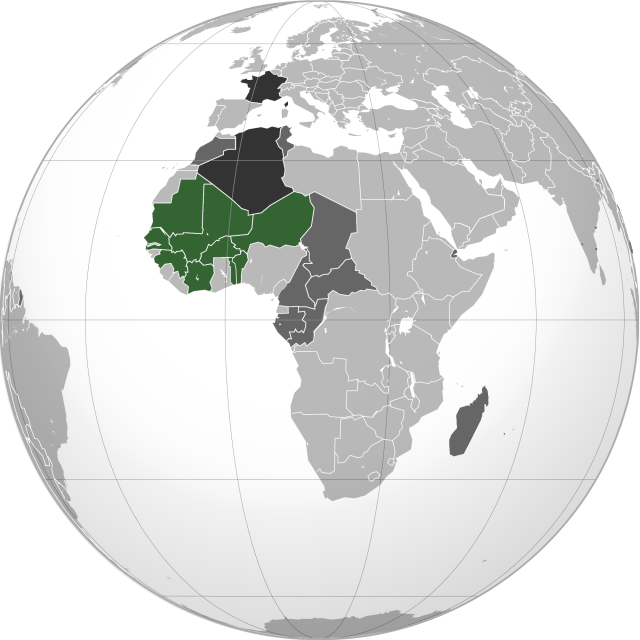French West Africa
French West Africa was a federation of French colonies in West Africa that existed from 1895 until 1958. Created in stages, French West Africa eventually included eight colonies: SENEGAL, French Sudan (present-day MALI), GUINEA, IVORY COAST, Dahomey (present-day BENIN), Upper Volta (present-day BURKINA FASO), NIGER, and MAURITANIA. France established the federation to help coordinate French military efforts to dominate West Africa. French West Africa had a governor-general who supervised the colonies and an army that dealt with any remaining armed resistance to colonial rule. The city of DAKAR in Senegal became its capital.
At first French West Africa received economic support from France. However, in 1900 France declared that the federation must be self-sufficient. Although the colonies could borrow money from France, they had to rely primarily on their own resources.

By 1920 the military had brought the region entirely under French control, and the borders of the colonies were fixed. Each colony had its own capital city, budget, and lieutenant governor. Reporting to the lieutenant governor were regional officials called commandants, who had responsibility for managing districts within the colony.
French West Africa had a highly centralized colonial government. The lieutenant governor of each colony reported to the governor-general in Dakar. He was the only colonial official allowed to communicate directly with the government in France. All laws regarding the economy, education, and health originated in Dakar, and decisions on all local matters needed approval from the governor-general. As the management of the colonies grew more complex, authority became even more concentrated in Dakar. For this reason, Senegal enjoyed a position of prominence within French West Africa.
Under French colonial administration, Africans were confined to the lower ranks of government, where they worked as clerks, interpreters, and police. The French also appointed Africans to serve as chiefs, who represented the colonial government on a local level. The chiefs held considerable power. Their responsibilities included collecting taxes, supervising public works, and recruiting soldiers and laborers for the colony. However, they were constantly required to prove their loyalty to the colonial authorities to maintain their positions.
Regardless of its location or history, each of the colonies in French West Africa was forced to adopt the same political and economic structure. As a result, the colonies developed similar laws and political institutions. They also shared a common tax system. Customs taxes on exports financed the budget of the federation, and a personal tax imposed on Africans provided revenue to the individual colonies.
The French West African colonies provided raw materials to France and purchased goods manufactured in France. Agriculture was the most important economic activity in the colonies, each of which developed its own cash crops, such as peanuts, coffee, cocoa, and bananas. The emphasis on cash crops and export limited the development of other economic activities in the region.
In 1946 the French government made the West African colonies overseas “territories” of France. Each territory had an elected legislature and a representative in the French parliament. This was an important step toward the breakup of French West Africa. The process accelerated in 1956, when a French law called Loi-Cadre reduced the role of the colonial government in the federation. Two years later France changed the federation into an organization of states called the French Community. Member states gained responsibility for all governmental matters except foreign policy, currency, and defense.
In 1960 the colonies of French West Africa gained independence as separate nations. They each signed agreements with France that established new political and economic ties with the former colonial power. Today, these nations continue to reflect the influence of French West Africa in their language, administration, and culture. (See also Colonialism in Africa, French Equatorial Africa, Government and Political Systems, History of Africa.)